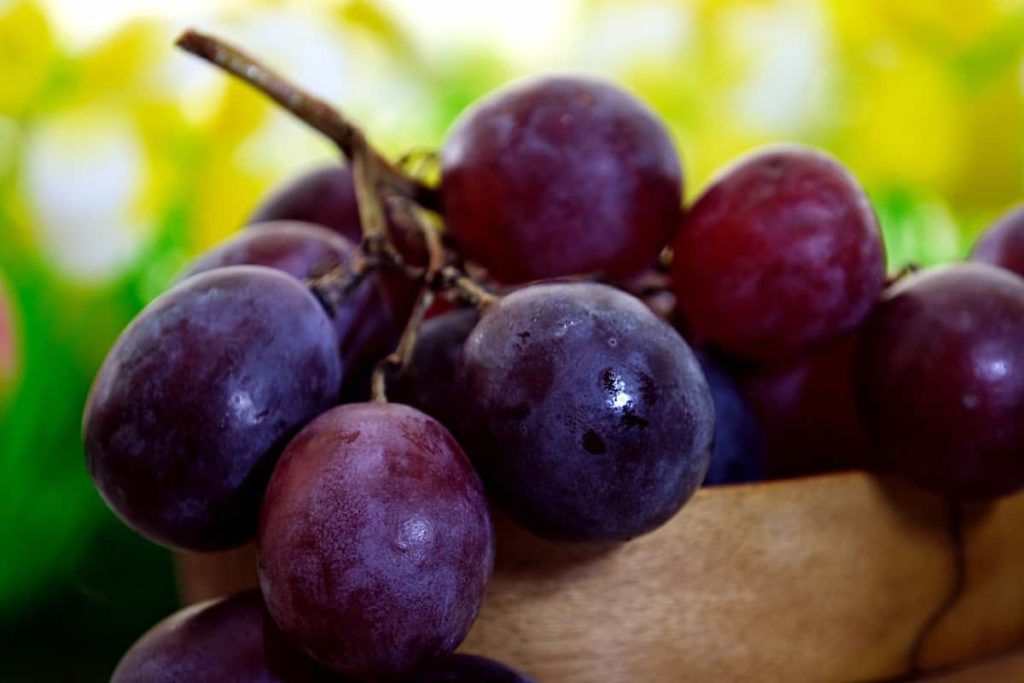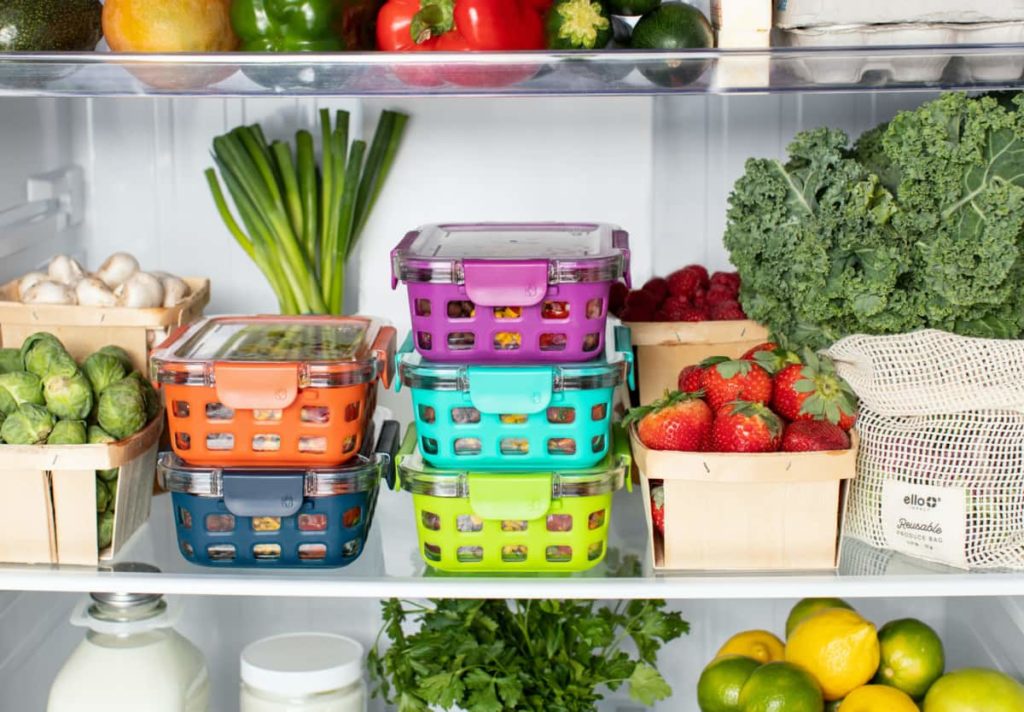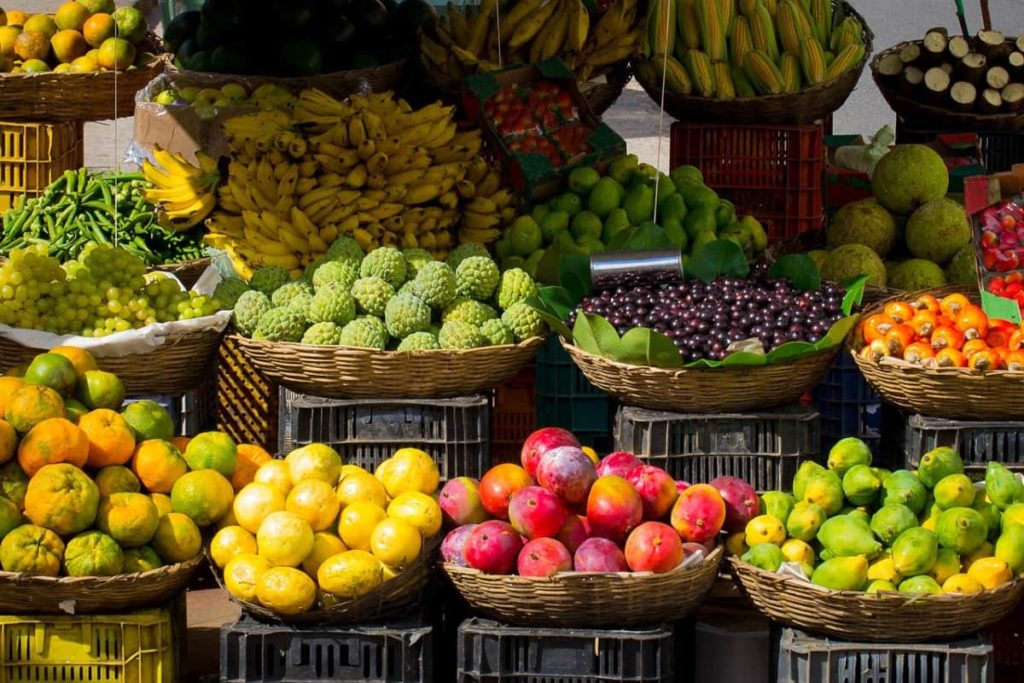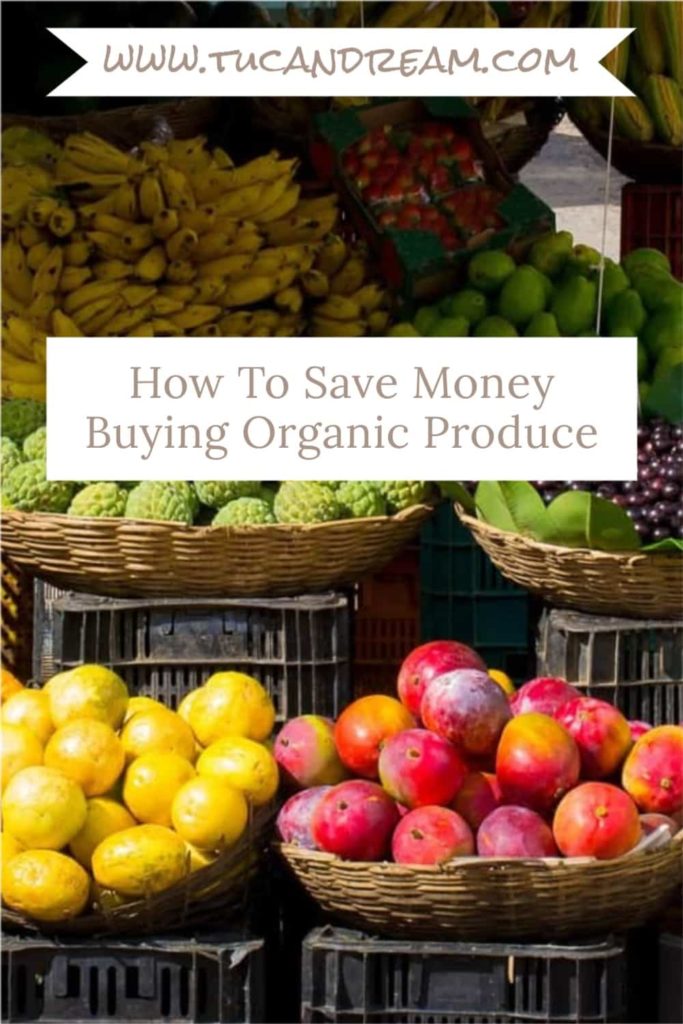5 Tips on How to Save Money Buying Organic Produce

Note: This post may contain affiliate links. Full disclosure here.
The Organic Dilemma
Table of Contents
Most of us would like to green up our lives to some extent, after all, we all know there is no planet B. But a trip to the produce aisle at the grocery store might have you second-guessing those ideas.
You want to buy those organic grapes but wow $3.99 a pound versus $2.99 a pound for the non-organic grapes. You look over your shoulder, no one is watching, and guiltily slip those non-organic grapes into your cart and make your getaway.

It doesn’t have to be this way. With a change in a few habits at home, you can buy those organic grapes and whatever other organic produce you desire without blowing the budget. Read on to discover tips on how you can save money buying organic produce.
Meal Planning:

Yeah yeah, you’ve heard about all the virtues of meal planning but who has time for that you ask? The question should be who doesn’t? If I told you that the average American household wastes over 30% of its food would you reconsider? That equates to $1,866 per household or almost $36.00 a week literally tossed in the trash (and further adding to our waste problem).
So now that I have your attention, you’re wondering how does meal planning solve this issue? The answer is simple.
First, you inventory what you actually have in the pantry and fridge and plan to use that up, and then purchase only what you need to complete your meal plan.
Secondly, meal planning enables you to see what’s on sale for the week and you can plan your meals around what is on sale that week. Meal planning also lets you take advantage of what is in season and what is not.
Thirdly, with good meal planning, you also incorporate leftovers into your meal plan and thus avoid those encounters with containers in the back of the fridge with contents that look like their a new lifeform escaped from a mad scientist’s lab.
For some really good suggestions on using kitchen scraps, visit the blog Scratchmadeconfessions and read this post: How to Reduce Food Waste
Clean out the Fridge and Freezer
I have to confess I hold my breath every time I open my freezer; will there be an avalanche of frozen food when I open the door or will this be one of those lucky times when I get away clean? Frankly, it drives me crazy. I rummage around looking for an item I swear I have, give up and add it to the list and buy it. Of course, the day after I buy the item, I find its lost counterpart in the freezer.
When I say clean out the fridge and freezer, I’m not recommending you pitch most of the food in the trash. I’m recommending you take stock of what you have and plan meals that will make use of it.
Don’t be like me. Keep what you freeze to within reason. If you pick something up on sale that isn’t on this week’s meal plan, incorporate it into next week’s plan.
If you’re a gardener and freeze some of the harvest, that’s awesome, but work that harvest into your meal plan or you’ll be like me, harvesting this year’s rhubarb with last year’s rhubarb still in the freezer. If you have more than you need, share with your neighbors or the local food pantry.
Store Food Properly

Proper food storage is essential to minimizing food waste. I’m guilty of just throwing most of my produce in the produce drawer of my fridge but do take some simple steps to prevent waste:
- I don’t wash most of my produce before storing it as washing introduces moisture which leads to decay.
- I go through berries and pick out any moldy or over ripe ones before putting them away. I eat the ripe ones first and the moldy ones are tossed into the compost.
- I only store what should be stored in the fridge. Potatoes and onions are stored at room temperature and not together. Most fruit is stored at room temperature until ripe, and then into the fridge it goes.
- Carrots and celery spoil quickly if not stored in an airtight container. I use a reusable gallon silicon bag for storing my vegetables. You can also wrap it in aluminum foil or store in a resealable produce container. Be sure to chop off the greens before storing.
- I use clear glass containers to store leftovers: If I can see what’s in a container I’m much more likely to use it. And I’ve learned to label anything that goes into the freezer. Purchase some freezer tape and a permanent marker and you’ll never feed your child kong stuffing thinking it is frozen soup (this almost happened to me except it looked a little odd, and I smelled it before serving).
If you wish to read more on proper fruit and vegetable storage, here is a link to a great article on storing fruit and vegetables: How to Store Fruits and Vegetables to Reduce Waste.
Buy Only What you Need
It seems silly to write this recommendation but I think too often we impulse buy because we see something that looks tasty and just add it to our cart with no plans on how we’re going to use it. Buy only what you need, and should you succumb to temptation make a plan for the item and incorporate it into your meal planning, or low and behold it’ll be found decaying in the produce drawer two weeks later and end up in the trash bin.
Be realistic about what your family will eat between grocery shopping trips. If you have a family with growing children you probably can’t keep enough fruit around for them to eat, but if it’s just yourself a little goes a long way. Produce doesn’t get fresher, so if in doubt buy less and stop on the way home and pick up more should you run out. Be careful about buying in bulk when buying produce as unlike other food items that may last a long time, most produce doesn’t keep well.
Want to really get organized? Make a fridge freezer list so you know what you have in there. They even have apps for this, one appropriately named Empty My Fridge. Once I’ve eaten through most of the food in my freezer I may actually use the app or keep a list. You can also find a free downloadable pantry staples list here: How to Stock a Homestead Pantry
Buy Local and “Ugly” Produce
One of my favorite pastimes is visiting farmer’s markets. They are a great source for fresh local produce, and while some of the fruit and vegetables may not be sold as organic it often is every bit as fresh and insecticide-free as organic produce, it’s just that the farmer hasn’t completed the organic certification process. If in doubt, ask.

If you have ever eaten fresh fruit picked off of a tree or vegetables grown in your home garden, you know that taste just can’t be replicated in mass growing systems, but it certainly can be found at farmer’s markets.
Somewhat of a “new kid” on the block is “ugly” produce. Ugly produce is cropping up at many supermarkets. These are the fruits and vegetables that aren’t perfect, perhaps they are blemished in some way or are a funky shape or color. Look for them when you shop they are usually just as fresh as the regular produce and are sold at a significant discount.

You can also purchase “ugly” produce shipped to your door. “Misfits Market” sells organically and sustainably grown produce shipped to your door at what they claim to be up to 40% off grocery store prices.
Why Spend the Extra for Organic Produce?
Corporate Farming Facts:
In this day and age of the all mighty dollar, profits motivate producers more than consumer health. Some call it a fad but it’s hard to deny how corrupt corporate farming has become. Here are just a few facts:
- Monocropping, the practice of growing a single crop year after year on the same land, is very damaging to the environment, using vast amounts of agrichemicals reduces soil fertility, promotes soil erosion and pollutes local waterways.
- Corporate farming has unbridled power to influence politicians and control the marketplace, pushing down prices paid to family farmers and forcing them out of business. Just a handful of corporations control our food network which leaves the public at their mercy.
- Use of GMO’s has proliferated with no concern for human health. Studies have shown that there are risks associated with GMO food including infertility, accelerated aging, immune problems to list a few.
- Only 1% of of applied pesticides reach the “pests”. Think about that: Millions of pounds of pesticides applied annually, with 99% entering the environment.
Organic Farming Facts:

In contrast, organic farming principles promote sustainability over the long term, diversity, and are providing salvation to the family farm. Here are a few organic farming facts:
- To be labeled organic, produce must be grown on a certified organic farm. To achieve that certification a farm must be managed organically for 3 years prior to certification. Organic operations must maintain or enhance soil and water quality while also conserving wetlands, woodlands and wildlife. Synthetic fertilizers, sewage sludge, irradiation and genetic engineering may not be used.
- Studies have shown organic produce is better for you, with more nutrients, less heavy metals and much less likelihood of contamination from pesticides.
- Organic soil contains more carbon than non-organic soil, so if climate change is of concern to you supporting organic farmers will help keep our air cleaner.
- With organic produce sales skyrocketing, family farmers are being given a profitable farming alternative, one that requires an investment of time and a steep learning curve but not as huge an investment in dollars.
More information about what constitutes organic practices can be found on the USDA Organic Practices Fact Sheet.
Can You Afford Not to Shop Organically?
Implementing these few changes in your food consumption practices can enable you to save money buying organic produce, so what’s holding you back? Be the change our earth so drastically needs.
Related posts: April is Earth Month-Let’s Shop and Live Green and How to Make My Kitchen More Eco-Friendly
Share this on Pinterest to help Mother Earth!









31 Comments
Amber
This post is so thoughtful and well-researched, thank you for these tips. I think it’s so important for us to know what organic actually means and how it might benefit our health and the environment–thanks for this clear explanation!
Carolyn
Amber, thanks for the kind words. You’re right it is important that people know what organic actually means to us and our earth.
Hope
This is a great article! Very informative! I don’t always have organic produce on offer where I live but when we move back to the States, I’m planning on a fully organic diet.
Carolyn
I’m surprised that Japan doesn’t have organic produce readily available. And I guess having your own garden might be tricky if you live in tight quarters.
Meghan
This is such a fantastic article! Thank you for listing out corporate farming vs organic farming, it was very insightful. I’ve recently switched to buying organic produce on ocassion to only buying organic produce because of most of the reasons you listed here. Thank you for sharing all this great information and inspiring others to buy organic!
Carolyn
Awesome, I was like you until recently when I decided being eco-conscious and not buying organic produce all the time just doesn’t make sense!
Grace This Place
So good!!! Thank you for sharing and reminding me of why we do what we do!
Carolyn
My pleasure, thanks for being an earth lover!
Alex
Very intersting post. Thank you for shaing this information on organic produce and corporate farming.
Carolyn
My pleasure!
Miriam
Loved the ideas you presented! As a vegetarian, I tend to buy lots of vegetables and produce and need to be more watchful of waste. I’ve never considered that washing produce before storing would speed up decay- gotta change that! Thanks for the great tips!
Carolyn
Luckily for me I’ve always been too lazy too wash vegetables before storing them, but I’m glad the post may keep your produce fresh longer.
Michelle from Hiking Bingo
I often find myself in the organic dilemma as well. I try to buy organic as much as I can while mentally overcoming the price difference. But in the long run, the “price” of my family’s health ultimately wins out and helps motivate me to buy organic!
Patrick
We usually buy “ugly” veggies because nobody else does. As long as it’s not bad, it’s good, ya know? Besides, we usually cut them up for a recipe, anyway, right? So why worry about what it looks like. 🙂
Carolyn
Very true, that’s probably a whole other story, how much produce is thrown out by the stores.
Jimmy
thanks for these helpful tips
Carolyn
My pleasure.
Claudia
Hey, these are really great tips! I second all of those, and I am a nutrition coach! Anyway lovely blog and Costa Rica looks amazing, I will need to visit at some point in my life!
Carolyn
I’m glad I have a nutrition coaches stamp of approval!
Martina
Love this! I am reminded of one of my resolutions for this year – to buy more organically produced products. Thank you so much for sharing this. I’ll definitely be doing this now.
Carolyn
Great! After writing the post reaffirmed my buying organic produce whenever available!
Florencia
What a great detailed article! I do feel the same when I open the freezer! And with regards to putting all in containers, that is a great idea!!!
Carolyn
Glad I’m not the only one! But I’m working on fixing that!
W. Santiago | Literal Med
Thank you for all these tips!
Carolyn
You’re welcome! I hope they help you to eat organic foods.
Pantea
I love this post and think that the 5 tips on how to save money buying organic produce is an article everyone needs to read. I go to the farmers market in our town once a week and buy only what we need. I notice that organic produce tastes significantly better and I’m grateful to support our local farmers. Meal planning has been crucial in preventing waste and I put together a helpful guide for beginners https://pantearahimian.com/the-best-meal-planning-guide-for-beginners/
Carolyn
Yes fresh produces tastes so much better, even potatoes do!
Leslie
I’ve been wanting to try the Misfits food, I’ve heard good things about it from the reviews i’ve read. Just because you eat with your eyes first doesn’t mean the ugly food gets left out, its food too. I’m trying to get better about “shopping my pantry & frezer”, i often forget what I have waiting to be thrown into a dish.
Carolyn
Agreed! I think we should all start grocery shopping with opening the freezer!
Carol L
Very nice post!
I try to buy as much as I can organic, but with the “advance” in a product called “Apeel”, as well as an “organic” version, I am trying to get it together and grow most of my own foods. I came from ‘city dwellers’ who never had any gardens, and went from there to a family and never gardened myself. Now I’m old and wish I had the experience of families of gardeners!
I see that the photo of what appears to be rectangle glass containers with maybe silicon added on for the refrigerator containers is not the same as the plastic ones you link to. Can we buy the ones in the photo? I try not to use plastic for anything voluntarily….. Very nice post. I got here via a link in a Milk Glass Home comment…..
Carolyn
Good for you, gardening definitely has a learning curve. The containers you see are these ones: https://amzn.to/4i71nca
Thank-you for your kind words on my post and letting me know where you found me! Come back soon.